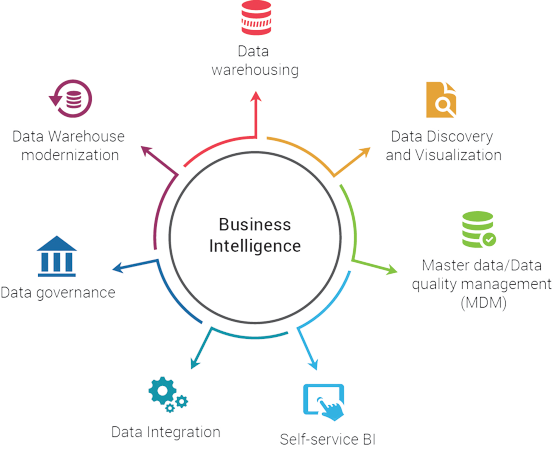BIGfish BI
BUSINESS INTELLIGENCE is a technology-driven process for analyzing data and presenting actionable information that helps executives, managers, and other corporate end users make informed business decisions.
Business Intelligence
The term Business Intelligence (BI) refers to technologies, applications, and practices for the collection, integration, analysis, and presentation of business information. The purpose of Business Intelligence is to support better business decision-making. Essentially, Business Intelligence systems are data-driven Decision Support Systems (DSS). Business Intelligence is sometimes used interchangeably with dashboards, data visualization, and executive information systems.
Business Intelligence systems provide historical, current, and predictive views of business operations, most often using data that has been gathered into a data warehouse or a data mart and occasionally working from operational data.
Software elements support reporting, interactive “slice-and-dice” pivot-table analyses, visualization, and statistical data mining. In a law firm, applications may tackle hours and revenue, collection cycles, leverage, utilization, and even profit, among many other sources of business data for purposes that include business performance management. Information is often gathered about other companies in the same industry, which is known as benchmarking.


The BIGfish Difference
BIGfish BI was developed to provide high-end BI capabilities to small and mid-sized firms without the cost and complexity normally associated with these technologies.
BIGfish can be deployed in a fraction of the time required to install legacy law firm BI tools and at a greatly reduced cost. BIGfish provides access to firm data that enables managers to make informed business decisions to guide the firm toward growth and profitability.
Lightning fast, users never have to wait for information
Intuitive design, easy to learn
Visual Analytics – Get to whats important faster
Web Based – Monitor your firm from anywhere
Once the domain of only the AMLAW 200, sophisticated Business Intelligence is now available to law firms of every size.
What We Have Here for You
Dashboards
Unlike many BI tools, BIGfish BI is a solution. We provide over 20 dashboards pre-configured for your firm with the default implementation. This means your firm can start benefiting from powerful analytics from day one. Be it top-down management analysis or an individual attorney's book of business, BIGfish offers a complete set of fast, easy-to-understand dashboards.
Self-Service BI
Self-service business intelligence (SSBI) involves the business systems and data analytics that give business end-users access to an organization’s information without direct IT involvement. Self-service Business intelligence gives end-users the ability to do more with their data without having technical skills. These solutions are usually created to be flexible and easy-to-use so that end-users can analyze data, make decisions, plan, and forecast on their own.
Compensation Assist
BIGfish BI can greatly simplify the process of compensation by creating a single export of information from the accounting system in a format suitable for the introduction of external data. BIGfish BI solves this by just running a report based on a date range and getting all of these columns as well as calculations on these columns at the click of a button. This module stores monthly buckets of activity for every attorney who touched a case in any way.
Profit Analysis
For most small to mid-sized law firms, solving the Profit Analysis question is a seemingly impossible challenge. Firms that have already gone down this path recognize the challenge both in definition and execution. BIGfish BI offers a variety of standard approaches as well as some best practices guidelines to make true profit analysis a reality.
Security - Administration
BIGfish BI provides an administrative portal for the administration of users. This security system allows for the creation of an unlimited number of user groups, with security governing which dashboards and features are available to members of each group.
Firms can also define and maintain user-defined fields at the client, matter, or employee level. These custom fields can be incorporated into custom dashboards as columns, groups, or filter attributes.

